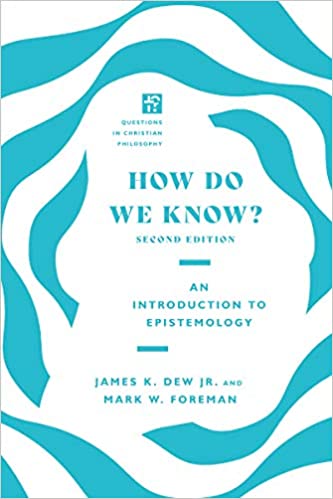A Brief Book Summary from Books At a Glance
by Steve West
About the Authors
James K. Dew Jr. (PhD, Southeastern Baptist Theological Seminary; PhD, University of Birmingham) is president and professor of Christian philosophy at New Orleans Baptist Theological Seminary.
Mark W. Foreman (PhD, University of Virginia) is professor of philosophy and religion at Liberty University.
Introduction
This book is an accessible introduction to epistemology written from a Christian perspective. It surveys all the major options in contemporary epistemological debates, as well as guides the reader through historical examples in Western thought. It is accurate in its representation of philosophical schools of thought and is helpfully succinct without sacrificing accuracy. Given the subject matter, this is a difficult balance to maintain. The attentive reader can come away with an excellent foundational grasp on epistemological issues.
Table of Contents
1 What is Epistemology?
2 What is Knowledge?
3 Where Does Knowledge Come From?
4 What is Truth, and How Do We Find It?
5 What Are Inferences, and How Do They Work?
6 What Do We Perceive?
7 Do We Need Justification?
8 Can We Be Objective in Our View of the World?
9 What Is Virtue Epistemology?
10 Do We Have Revelation?
11 How Certain Can We Be?
Summary
Chapter 1: What is Epistemology?
People tend to take knowledge for granted. Epistemology is the branch of philosophy that deals with questions of knowledge. How do we know what we know? What is the nature of knowledge and what are the sources of knowledge? What are the methods and procedures for arriving at knowledge, and what differentiates knowledge from mere belief or opinion? These—and many more—are the kinds of questions asked by epistemologists. Even from the youngest ages children ask questions to try to understand the world and gain knowledge about it.
Francis Bacon’s introduction of the inductive method for discovering scientific truth changed not only our understanding of the world, but it changed the world itself! School and careers all require growth in knowledge. To understand life and the world requires increasing knowledge. For many students studying philosophy, epistemology seems to be the hardest topic of all. Christianity has a unique perspective on epistemology that should be understood and shared. . . .
[To continue reading this summary, please see below....]The remainder of this article is premium content. Become a member to continue reading.
Already have an account? Sign In
